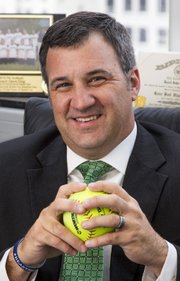David Sachar has packed a lot into his 47 years. He married young, started law school in the same week and has since worked as a deputy prosecuting attorney, a private-practice lawyer and, today, he’s executive director of the Judicial Discipline and Disability Commission.
SELF PORTRAIT
David Sachar
DATE AND PLACE OF BIRTH: April 13, 1969, New York
I WOULD DESCRIBE MY CHILDHOOD IN ROSE BUD AS an adventure. I swam in creeks, climbed mountains and milked a cow, Creamy, by hand for three years.
I’M MOST COMFORTABLE AROUND PEOPLE WHO are funny and enjoy humor.
I KNEW I WANTED TO BECOME A LAWYER WHEN I entered the Future Business Leaders of America business law competition as a senior in high school. I came in third in the state.
I WON’T EAT organ meats. I worked at a meat processing plant while in law school.
THE LAST TIME I CRIED WAS when my cat, Cake, died.
ONE GOAL I HAVE YET TO ACHIEVE IS to hold an elected judicial office.
TO STAY GROUNDED, I play softball.
I’LL STAY HOME TO WATCH a New York Yankees playoff game.
I’M MOST COMFORTABLE WEARING a jersey.
GUESTS AT MY FANTASY DINNER PARTY WOULD BE Derek Jeter, Dave Grohl, Ellen DeGeneres and Bill Burr.
THE ONE WORD TO DESCRIBE ME IS enthusiastic.
But in the middle of all that achievement and lawyering came a traumatic time he’d rather have avoided, for all involved.
In December 2007, when Sachar (pronounced Sack-er) was the commission’s second in command, close friends were in a car wreck in which their two children died. The husband sustained life-threatening injuries.
Even now Sachar doesn’t like to talk about it and guards the couple’s privacy.
He took time off from his job to represent them in a civil federal lawsuit that they eventually settled. Later, he helped in their search for a surrogate mother who was able to give the couple a set of twins they’re now rearing.
“My time helping them changed my view of life, true friendship and being a lawyer,” Sachar says.
His wife, Chrissie, says Sachar could share neither the legal nor emotional aspects of what he was going through with their friends. He wears confidentiality like a shield, she says, and his word is his bond.
“It was difficult to watch …,” she says, her voice cracking. “But at the same time, I was so proud of him because I knew how hard it was.”
Sachar is said to be highly regarded among his peers, seen as the go-to guy for counsel or advice. It makes him a natural leader for an agency that has been described as the guardian of the integrity of Arkansas’ judiciary.
“He’s not going to shy away from doing something just because it’s hard,” says Leigh Patterson, who worked with Sachar in the Pulaski County prosecutor’s office.
Adds childhood friend Jim Mc-Gill: “He’s been very, very committed to doing the right thing when no one else is watching.”
Sachar is preparing to have his photo made for this article, and though he’s not vain about his looks, he wouldn’t feel right without his fingernails trimmed. But with a busted thumb from a game in his competitive softball league, he needs help from his deputy director, Emily White.
“I’m not sure who is more scarred from that experience,” Sachar jokes later.
The two also have tried cases together — on one occasion, two in the same day — while working in the Pulaski County prosecutor’s office. Today they work in side-byside offices on the 10th floor of the Tower Building downtown.
When Sachar was deputy director of the Judicial Discipline and Disability Commission, he worked closely with then-director David Stewart. Coming from private practice, Sachar was eager to get back into public service, and Stewart hired him on a recommendation from friend and former colleague Hugh Finkelstein.
“There’s just something special, to me, about representing the state of Arkansas, or in this case … fighting corruption,” Sachar says.
The agency does not criminally prosecute judges for wrongdoings. Sachar’s team investigates reports of ethical misdeeds by judges and judge candidates and presents findings to the commission, which makes recommendations to the Arkansas Supreme Court. Sanctions can range from a written reprimand to a suspension with or without pay, or removal from office.
“I’ve been blessed in that I’ve always had somebody throughout my career who championed me. There was always somebody who looked out for me to make sure I got the opportunities to succeed. I hope I give that back.”
In one recent high-profile case, Cross County District Judge Joseph Boeckmann of Wynne agreed to resign to avoid fighting allegations of ethics violations regarding the use of his public position to draw young men into activities of a sexual nature in exchange for money, favorable legal treatment or both. The alleged misconduct extends back to the ’80s, when Boeckmann was a deputy prosecutor.
Boeckmann agreed never again to seek office as a judge in Arkansas. Investigations by state and federal authorities are ongoing.
About Boeckmann, Sachar has said, “Every minute he served on the bench was an insult to the Arkansas judiciary.”
“There are so many good people who have wanted their whole life to be a judge and have worked hard … they’re smeared with that same broad brush,” he adds.
In 2014, the Supreme Court ordered 20th Judicial District Circuit Judge Michael Maggio out of office after he admitted to making a wide range of contentious online comments about women, sex, race, divorce, bestiality and a legally confidential adoption case involving actress Charlize Theron. The commission recommended — and the high court agreed — that Maggio should be banned from the Arkansas bench.
Since then, Maggio pleaded guilty to unrelated federal bribery charges, tried to withdraw his plea, but was sentenced in March to 10 years in a federal prison and two years of supervised release. Maggio remains free pending an appeal.
Not all cases are as dramatic as Boeckmann or Maggio’s — some are technical or ethical violations by a judge or a judge candidate. An example would be a judge who had a substance abuse problem or a family issue that affected the way he did his job.
“I have great respect for the Arkansas judiciary, even more so than before I started in this job,” Sachar says. Mistakes happen. Judges are human too, he says. “It’s not like I took this job to be a crusader against the judiciary.”
Sachar’s job requires meticulous organization, a skill White jokingly says he lacks. So Sachar compensates by color-coding information in files and on marker boards.
White says Sachar makes up anything he lacks in office skills with intelligence and charisma. He’s a dynamic speaker and litigator who thinks quickly on his feet — “maybe better than any other lawyer I’ve worked with,” White says. “He puts 100 percent into it any time he takes the podium in a trial or at a speaking engagement.”
Sachar welcomes calls from judges any time they have a question about conduct. He has taken calls while waiting in line for a ride at a Disney theme park, while pheasant hunting in a wheat field in South Dakota and, once, as he was preparing to go into an MRI machine.
Later this month he’ll become president of the national organization of his peers, the Association of Judiciary Disciplinary Counsel, at the group’s annual meeting in Washington.
THE NATURE OF MAN
David Sachar and a sister, Victoria, were born in New York; a much younger brother, Jonathan, came along after Vincent and Gwendolyn Sachar moved the family to Plano, Texas. They landed in tiny Rose Bud (White County) when David was about 12. The elder Sachar left his career as a corporate lawyer in Dallas to start a nondenominational Christian church, Complete in Christ.
“He always wanted to have a place where people who had drug problems could come and get away from their circle,” David Sachar says of his father, who carried out his mission on the family farm. “We always had a bedroom with three or four guys who were trying to get out of their bad circumstances.”
Later, Sachar joined mission trips to Russia where he and others handed out Bibles on the street and visited prisoners and children in orphanages.
“For me, it was a continuing lesson in humanity,” Sachar says. It’s the greatest gift he got from his parents and one that has served him well as a lawyer and prosecutor, he adds.
“I’m a firm believer in the dual nature of man. People mean well and still screw up,” Sachar says. “That’s who we are, and you can’t be quick to say, ‘Those people are good; those people are bad.’ The truth is we’re a little bit of both.”
Childhood friend McGill of Little Rock says Sachar was driven even as a kid.
“He was all-in for whatever he did,” says McGill, who is director of commercial strategy for a steel company out of Birmingham, Ala. For example, Sachar would organize “gigantic” Whiffle ball tournaments on a super-size field he built. He even erected a replica of The Green Monster, the high left-field wall at Fenway Park, home to the Boston Red Sox baseball team.
David and Chrissie met at church camp when he was 13 and she was 12. Their first date was to his senior prom.
Sachar earned a social science degree from Harding University in Searcy and proceeded to the University of Arkansas at Little Rock’s William H. Bowen School of Law. He and Chrissie married the same week. They lived in a trailer in Rose Bud, and Sachar put himself through law school working at a meat processing plant in Heber Springs and umpiring baseball games in Searcy.
In those early years, they often communicated through sticky notes left on the refrigerator door.
Chrissie is administrative assistant to the high school principal at Pulaski Academy, from which their daughter, Abbie, recently graduated. The couple’s only child is a dancer on her way to Hollywood on a partial scholarship to the American Musical and Dramatic Academy. Only 50 dancers were picked from auditions in 189 locations across the country.
Chrissie gets emotional when talking about Sachar as a father. She says he’s “the perfect dad for a daughter.”
“I think she gets her confidence from the love she feels from him,” Chrissie says. “It’s a very special relationship, and it’s fun to watch. It’s a very natural, easy kind of love.”
Sachar says he would have liked a house full of girls, but Chrissie says her 52-hour labor with Abbie made her leery of having another child. The family has hosted two foreign exchange students over the last five years, one from Germany and one from Austria. Sachar calls them his “exchange student daughters.”
TRY, TRY AGAIN
Fresh out of law school, Sachar went to work for the Office of the Prosecutor Coordinator in Little Rock as a research attorney in 1994. He cut his teeth as a prosecutor in the 17th Judicial District prosecuting attorney’s office in Searcy and worked briefly in private practice there before Pulaski County Prosecuting Attorney Larry Jegley came calling in 1999.
For Jegley, Sachar tried mostly homicide and drug-related cases — about 90 in all. Sachar says working for Jegley provided the “perfect environment” in which to learn to try cases. He called his influential boss “nurturing, yet tough.”
Jegley, now in his seventh term as prosecuting attorney, recalls Sachar as “diligent, conscientious and dedicated to victims.”
“It takes a special kind of person to get up and keep going in the face of tragedy, sadness and setback,” he says. “David was right in the thick of it.”
Sachar recalls one particular case in which the victim of a kidnapping and battery wouldn’t cooperate in prosecuting her abuser. Sachar and colleague Leigh Patterson decided to try the case without her. The victim ended up testifying for the defendant, but the guy was convicted anyway.
“We were encouraged to take chances on cases like that,” Sachar says. They also convicted the state’s first-ever designated sexually violent predator.
Patterson, now senior chief deputy in Jegley’s office, says Sachar is a good storyteller, and that’s what makes him an effective trial lawyer. He also has the ability to communicate his position and is a good judge of character, she adds.
Sachar left Jegley’s office in 2003 for a job at the Little Rock firm of Wilkes & McHugh P.A., trying civil lawsuits against nursing homes and other medical care providers.
He takes his aggression out on a softball, playing weekends on a traveling United States Specialty Sports Association (USSSA) team called Northside Steel out of Jonesboro. He plays back-up second baseman and coaches when he’s not on the field.
“It’s great for me to be around people who are normal and don’t know me necessarily as this job,” Sachar says.
Nearly every year since 1999, he has taken a major road trip with a couple of fellas from high school and a few others who call themselves the Bull Moose Football Club. The group goes to a college football game of a past national champion. One year it was Notre Dame against Navy in Dublin. Last season is was the Texas-West Virginia matchup. This fall, they’ll attend the Montana-Montana State game in Missoula.
It takes about nine months to plan but is worth it, says McGill, a founding member.
Figuring his softball days are nearing their end, Sachar recently bought a bass guitar. Over the next several years he plans to learn to play, as well as shoot a recurve bow, speak Spanish “and die with several things on my list that never got done because there’s always something to do.”
High Profile on 07/03/2016


